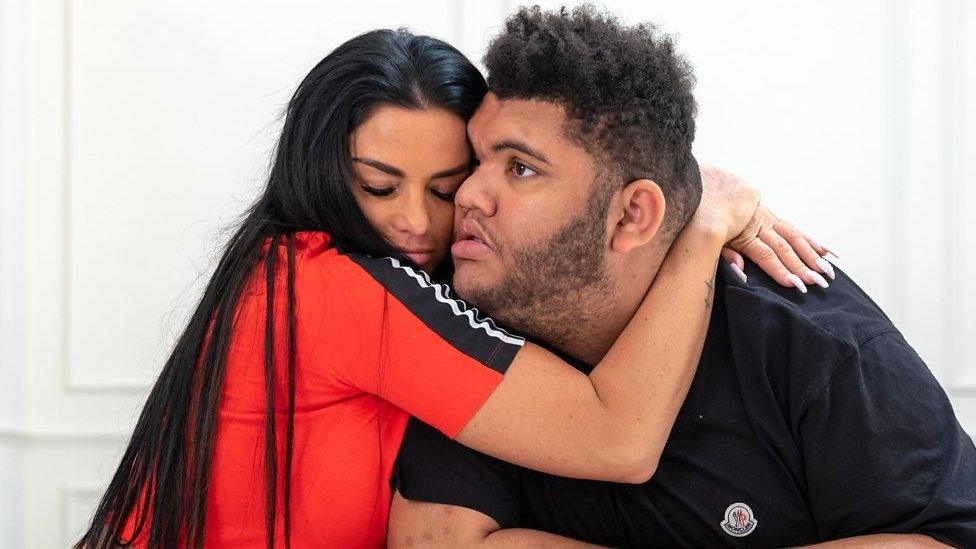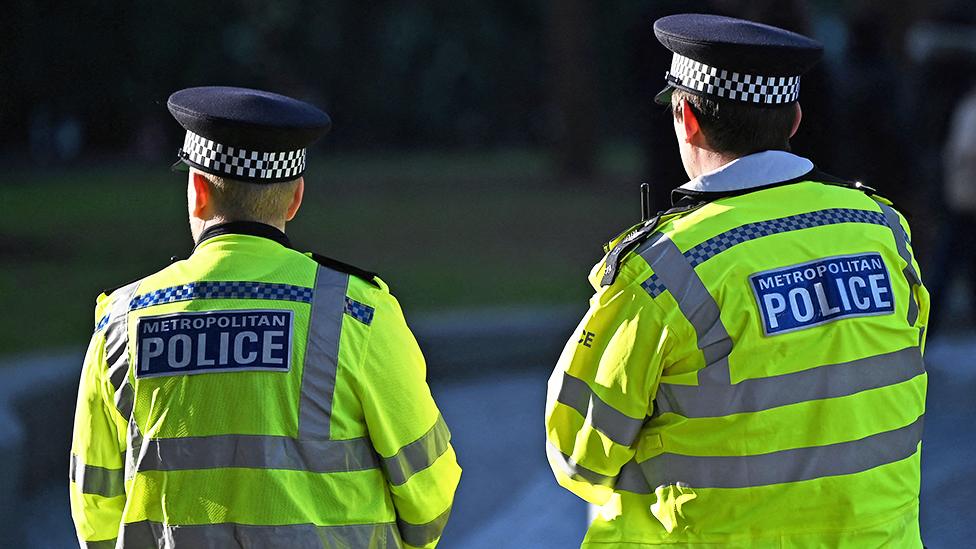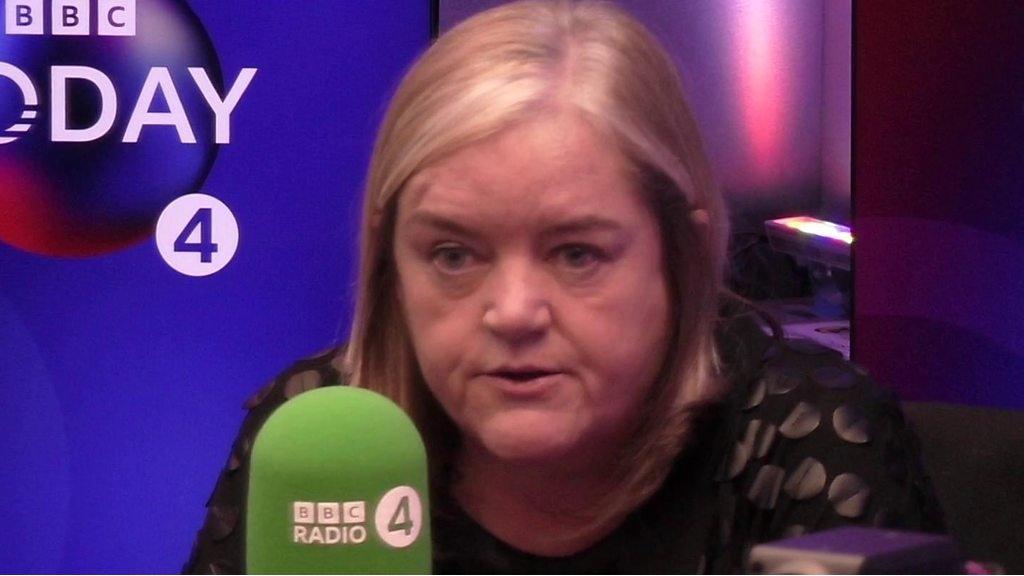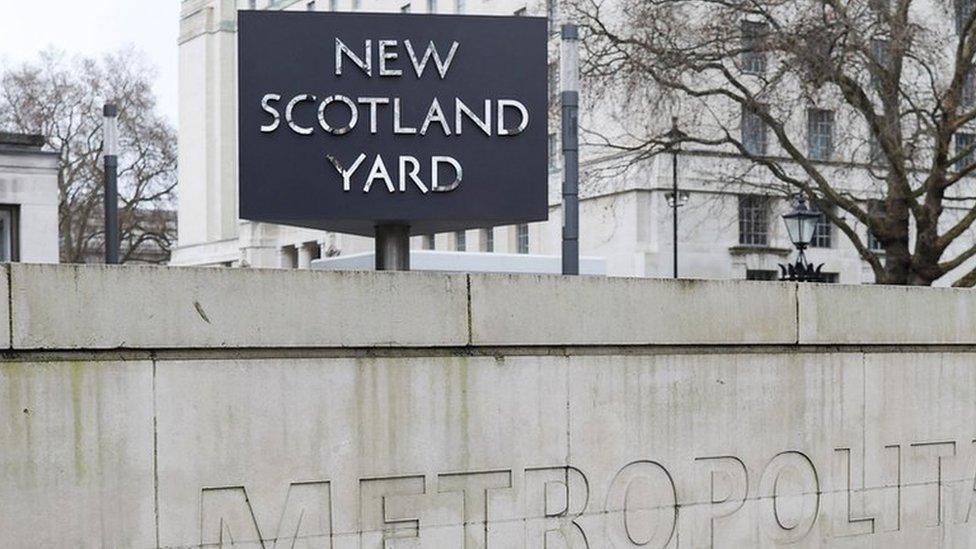Met Police officers sacked over Katie Price son messages
- Published

Some of the messages mocked Katie Price's son Harvey
Two Metropolitan Police officers have been sacked over offensive messages that were shared in a WhatsApp group.
The model Katie Price's son Harvey, who has learning difficulties, was a target for abuse in the group.
The men were two of eight serving and ex-officers found to have committed gross misconduct. The others had either already resigned or been dismissed.
In the wake of the dismissals, the Met Police admitted it feared the public might not get in touch in an emergency.
'Awful position'
Speaking about concerns that people might be put off from contacting the force in the current climate, Cdr Jon Savell told the BBC: "Of course we are [worried].
"That's an awful position to be in; we are the service that [people] must rely on. We must do everything we can to make sure that the public feel confident to do that."
A disciplinary hearing that concluded on Thursday heard there were messages shared in the group that were racist, sexist, homophobic and transphobic.
PC Glynn Rees and "Officer B", who was granted anonymity for the duration of the six-day Met Police hearing, were both sacked by the disciplinary panel. The Met later named Officer B as PC Dave Selway.
The pair, along with former Sgt Luke Thomas, former acting Sgt Luke Allen and former PCs Kelsey Buchan, Lee South, Darren Jenner and Carlo Francisco, were also barred for life from the police service.
The panel said the six former officers would also have been sacked had they still been serving.
'Repulsed and ashamed'
Some of the messages, sent between May 2016 and June 2018, "applauded sexual violence against women", the panel heard.
There were derogatory comments about 20-year-old Mr Price, who has Prader-Willi syndrome, autism and is partially sighted. Other messages were about a junior female officer, known in the hearings as Officer A.
The panel found former Sgt Thomas, the most senior-ranking officer in the WhatsApp group, appeared to have been "one of the most active participants".
He mocked Mr Price's weight and called Officer A "ugly". He also joked he should name his dog "Auschwitz" or "Adolf", or "Fred" or "Ian" after "my two favourite child sex killers", the hearing was told.

Analysis
Sonja Jessup, BBC correspondent
It is the latest in a series of cases where current or former Met Police officers have been found to have shared highly offensive messages in WhatsApp groups, and may add to existing alarm among the public about toxic and discriminatory attitudes within the force.
The ruling comes weeks after Baroness Casey's year-long review into the force highlighted cases where officers were told to delete messages that might incriminate them.
The Met will hope the panel's decision sends a strong message that discriminatory attitudes are not acceptable, and that it is the duty of all officers to call it out.

The panel's legal chair Christopher McKay said the messages had caused "significant harm" to the "already tarnished reputation of the Metropolitan Police Service (MPS)", and had upset TV presenter Ms Price and her son.
He said: "Harm has been caused to Harvey Price and his mother, who have learned of the posts recently, and has resulted in a loss of confidence in the MPS by Katie Price."
Following the panel's ruling, the Met apologised to the Prices, with Cdr Savell saying: "I was repulsed and ashamed to read the deeply offensive messages sent by these officers and I utterly condemn their behaviour.
"I am deeply sorry to those who have been the subject of such awful, disgusting messages."
The panel's findings come at a time when the Met has confirmed plans to roll out access to WhatsApp on all work phones.
Roughly 21,000 frontline officers have been issued with a work phone, with the remaining 9,000 officers expected to receive a device soon, the force said.
"Providing our people with access to WhatsApp, and other messaging tools, on controlled and monitored Met devices reduces the risk of abuse and demonstrates the trust we have in the majority of our honest and hard-working officers and staff," a spokesperson said.

Follow BBC London on Facebook, external, Twitter , externaland Instagram, external. Send your story ideas to hellobbclondon@bbc.co.uk, external
Related topics
- Published13 April 2023

- Published21 March 2023

- Published21 March 2023

- Published22 February 2023

- Published21 February 2023

- Published17 February 2023
